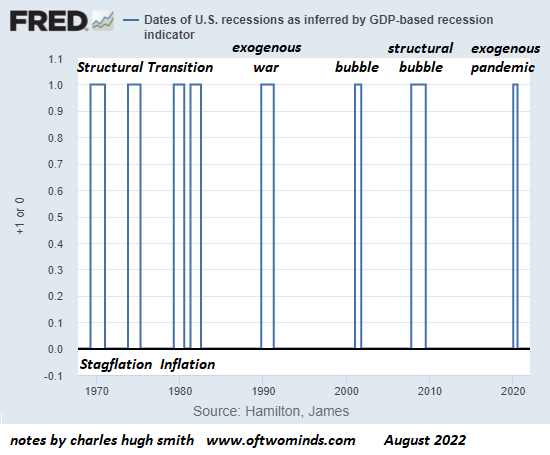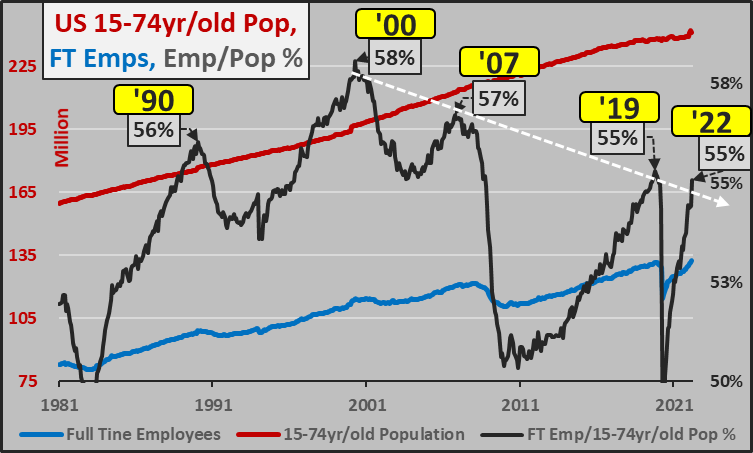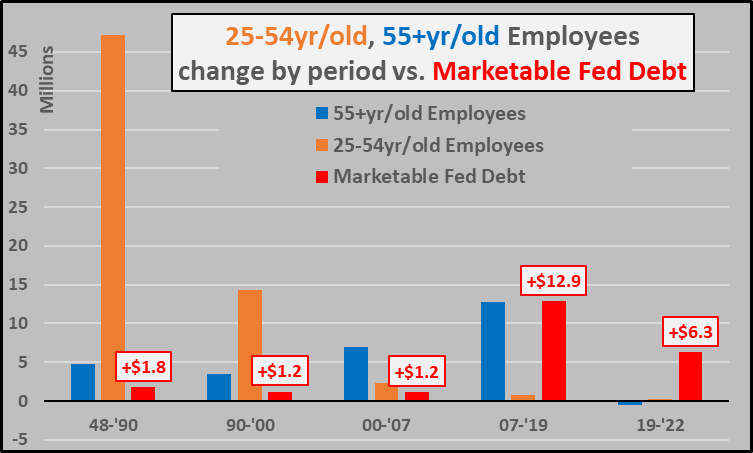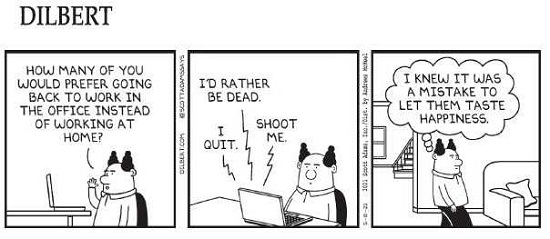Price cutting is being replaced with price gouging, a substitution that consumers recognize as inflation..
Events may show that there are no winners, only survivors and those who failed to adapt.
Some recessions are brief, necessary cleansings in which extremes of leverage and speculation are unwound via painful defaults, reductions of risk and bear markets.
Some are reactions to exogenous shocks such as war or pandemic. The uncertainty triggers a mass reduction of risk which recedes once the worst is known and priced in.
Far less frequently, structural recessions are lengthy, tumultuous upheavals that can set the stage for excellent long-term expansion or unraveling and collapse. In these structural recessions, 10% to 20% of the workforce loses their jobs as entire sectors are obsoleted and jobs that depend on excesses of debt and speculation go away.
In the U.S. economy of today, this would translate into a minimum of 14 million jobs vanishing, never to return in their previous form and compensation.
The old jobs don’t come back and new jobs demand different enterprises, training and skills. Unemployment remains elevated, spending is weak and productivity is low for years as enterprises and workers have to adjust to radically different conditions. If the economy and society persevere through this transition, the stage is set for the reworked economy to enjoy an era of renewed prosperity and opportunity.
If an economy and society can’t complete this transition, stagnation decays into collapse.
I’ve annotated a St. Louis Federal Reserve chart of U.S. recessions since 1970 to show the taxonomy described above.The stagflationary 1970s / early 1980s were a lengthy, tumultuous structural upheaval; the 1990-91 recession was triggered by the First Gulf War; the Dot-Com Bust in 2000-2002 was largely the unwinding of speculative excesses in the technology sectors (similar to the radio-technology bubble of the 1920s); the Global Financial Meltdown (aka the Global Financial Crisis) was the structural reckoning of unregulated global financialization excesses, and the 2020 recession was the result of policy responses to the Covid pandemic.
Each of these resulted in a multi-quarter decline in GDP, the classic (though flawed) definition of recession.
Recessions that cleanse the system of financial deadwood are necessary and yield excellent results.Per the Yellowstone Analogy (The Yellowstone Analogy and The Crisis of Neoliberal Capitalism (May 18, 2009) and No Recession Ever Again? The Yellowstone Analogy (November 8, 2019), the deadwood of excessive speculation, leverage, fraud and debt issued to poor credit risks must be burned off lest the deadwood pile up and consume the entire forest in a conflagration of the sort that was narrowly averted in 2008-09 when fraud and risk-taking had reached systemically destructive extremes.
The problem with letting deadwood pile up so it threatens the entire forest is the policy reaction creates its own extremes. The coordinated central bank policies unleashed in 2008 and beyond established new and unhealthy expectations and norms, the equivalent of counting on central bank water tankers to fly over and extinguish every firestorm of excessive risk-taking and fraud.
Those emergency measures create their own deadwood, distortions and risk, and are not a replacement for prudent forest management, i.e. maintaining a transparent market where excessive risk is continually reduced to ashes in semi-controlled burns.
When systemic changes in the economy and society demand structural transitions, the resulting tumult can either creatively rework entire sectors, weeding out what no longer works in favor of new methods and processes, or those benefiting most from the old structure can thwart desperately needed evolution to protect their gravy trains.
If change is stifled as a threat, the entire economy enters a death-spiral to collapse. Some eras present an economy with a stark choice: adapt or die. Adaptation in inherently messy, as new approaches are tried in a trial-and-error fashion and improvements are costly as the learning curve is steep.
Sacrifices must be made to achieve greater goals. as I outlined yesterday in A Most Peculiar Recession, in the 1970s the U.S. economy was forced to adapt to three simultaneous structural changes:
1. The peak of U.S. oil production and the dramatic repricing of oil globally by newly empowered OPEC oil exporters.
2. The pressing need to reconfigure the vast U.S. industrial base to limit pollution and clean up decades of environmental damage and become more efficient in response to higher energy prices.
3. The national security / geopolitical need to encourage the first wave of Globalization in the 1960s and 1970s to support the mercantilist economies of America’s European and Asian allies to counter Soviet influence.
Coincidentally, this last goal required the U.S. expand the exorbitant privilege of the U.S. dollar, the primary reserve currency by exporting dollars to fund overseas expansion of U.S. allies like Japan and Germany and running permanent trade deficits to benefit mercantilist allies.
These measures created their own distortions which led to the Plaza Accord in 1985 and other structural adjustments. Ultimately, the U.S. managed to adapt to a knowledge economy (Peter Drucker’s phrase) and a more efficient means of production, resulting in a much cleaner environment and a leaner, more adaptable economy.
The deadwood of hyper-financialization and the distortions of hyper-globalization have now piled up so high that they threaten the entire global economy. Those who have feasted most freely on hyper-financialization and hyper-globalization must now pay the heavy price of adjusting to definancialization and deglobalization.
Those who have been living on expanding debt and soaring exports are in for a drawn-out, wrenching structural adjustment to the reversal of these trends and the fires sweeping through the deadwood that’s piled up for the past two decades.
There will winners and losers in this global structural upheaval. Mercantilist economies that feasted on 60 years of export expansion will be losers because there is no domestic sector large enough to absorb their excess production, and those who feasted on the expansion of debt to inflate asset bubbles will find their reluctance to conduct controlled burns of their speculative debt-laden deadwood will exact a devastating price when their entire financial system burns down.
Those who didn’t rely on exports for growth will find the transition much less traumatic, as will those who maintained a regulated, transparent market for credit that limited excesses of leverage and high-risk debt.
Those who adjust to structurally higher energy costs by becoming more efficient and limiting waste via Degrowth will prosper, all others will sag under the crushing weight of waste is growth Landfill Economies. I explain why this is so in my new book Global Crisis, National Renewal.
Recessions which are allowed to clear the deadwood and encourage adaptation yield excellent results. Those which don’t lead to the entire forest burning down. Economies optimized for graft, corruption, opacity and benefiting insiders will burn down, along with those that optimized speculative extremes of debt and those too rigid and rigged to allow any creative destruction of insiders’ skims and scams.
Events may show that there are no winners, only survivors and those who failed to adapt and slid into the dustbin of history.
Chart courtesy of St. Louis Federal Reserve Database (FRED)

Recent podcasts/videos:
Save Money On Food, Get Free Gold & Silver, Beat Price Inflation (1:08 hrs)
It’s Time To End The Fed & Return To A Decentralized Currency (X22 Report, 38 min)
Charles Hugh Smith On Inequalities And The Distortions Caused By Central Bank Policies (FRA Roundtable, 30 min)
Tectonic Shift of Mercantilism Revalued (Gordon Long, Macro-Analytics, 42 min)
My new book is now available at a 10% discount this month:When You Can’t Go On: Burnout, Reckoning and Renewal.
If you found value in this content, please join me in seeking solutions by becoming a $1/month patron of my work via patreon.com.
My recent books:
Global Crisis, National Renewal: A (Revolutionary) Grand Strategy for the United States(Kindle $9.95, print $24, audiobook) Read Chapter One for free (PDF).
A Hacker’s Teleology: Sharing the Wealth of Our Shrinking Planet (Kindle $8.95, print $20, audiobook $17.46) Read the first section for free (PDF).
Will You Be Richer or Poorer?: Profit, Power, and AI in a Traumatized World
(Kindle $5, print $10, audiobook) Read the first section for free (PDF).
Pathfinding our Destiny: Preventing the Final Fall of Our Democratic Republic($5 Kindle, $10 print, (audiobook): Read the first section for free (PDF).
The Adventures of the Consulting Philosopher: The Disappearance of Drake$1.29 Kindle, $8.95 print); read the first chapters for free (PDF)
Money and Work Unchained $6.95 Kindle, $15 print)Read the first section for free
Become a $1/month patron of my work via patreon.com.
NOTE: Contributions/subscriptions are acknowledged in the order received. Your name and email remain confidential and will not be given to any other individual, company or agency.
|
Thank you, Thomas T. ($108), for your outrageously generous contribution to this site — I am greatly honored by your support and readership. |
Thank you, Gale S. ($25), for your much-appreciated generous contribution to this site — I am greatly honored by your support and readership. |
Watch where capital is flowing. That’s pretty much all you need to know to predict the future.
A strong currency exports inflation to those nations which do not issue the currency.
Systemic corruption on this vast scale optimizes failure and collapse.
Pick one, America: national security of the essential material foundation of everything, the industrial base, or “global markets,” maximizing greed / corporate profits.
What is “money”? “Money” is a claim on the essentials of life. Ration cards are claims on essentials.
It’s time to reprogram the conditions of the economy to serve the many rather than the few.
The economy has reached an inflection point where everything that is unsustainable finally starts unraveling.<
Workers are voting with their feet, and that’s difficult to control. When values and expectations change, everything else eventually changes, too.
What happens when the workforce no longer wants to work? We’re about to find out. As with all cultural sea changes, macro statistics don’t tell the full story. The sea change is better illuminated by anecdotal evidence: workers constantly quitting to take better jobs; zero loyalty to corporate employers; workers cutting hours from full-time to part-time; workers going out for lunch and never coming back; workers giving up on selling sugar-water for the rest of their lives (echoing Steve Jobs’ famous challenge to John Scully: “Do you want to sell sugared water for the rest of your life? Or do you want to come with me and change the world?”) and giving up on owning an insanely over-valued house.
Workers may sell sugar-water but their hearts are no longer in it. Some are interested in changing the world, and others are interested in changing their own lives as the means to change the world.
Numerous articles have been published describing these cultural changes in values and expectations: here are three:
From the Great Resignation to Lying Flat, Workers Are Opting Out: In China, the U.S., Japan, and Germany, younger generations are rethinking the pursuit of wealth.
‘We are the last generation’: China’s youth rallied around a now-censored social media hashtag to rage about their disillusionment with life and disdain at draconian lockdowns
The rise of ‘bai lan’: why China’s frustrated youth are ready to ‘let it rot’
Note that this cultural shift is global. The dynamics of the global economy are similar the world over: capital has garnered most of the gains of the past generation, leaving shards for labor; the “good things in life” such as owning a house and nice vehicle have soared out of reach of all but the top 10% of households; youth were implicitly promised “good paying jobs and fulfilling careers” if they went to university, and then they graduate into a global economy of dead-end jobs and cut-throat competition for the few slots at the top of the constantly eroding sand pile.
The global lockdown revealed several great truths to many idled workers: 1) I’m wasting my life slaving away for an employer to whom I am disposable; 2) trying to own the upper-middle class lifestyle is not worth the sacrifices required, and 3) there are ways to work less and still get by, and live a better life doing so.
Once the rats are no longer interested in the rewards because they’re out of reach, they jump off the wheel.Once the tax donkeys flop down in exhaustion and ask why they’re working so hard to pay outrageous taxes and fees, they lose interest in carrying their heavy load ever again. When debt-serfs stop and calculate their chances to pay off their debt and reach upper-middle class Nirvana, they bail on the entire project.
People found they could get by on much less than they previously reckoned. Some found niches in the informal or gig economies, others secured a quasi-pension in the social-welfare system, others decided that net-net of expenses, they were better off quitting and staying home to care for the kids rather than pay thousands of dollars in higher taxes and childcare fees for the privilege of busting their derrieres on an endless treadmill.
People realized they wanted a career and worklife they defined and controlled rather than one defined and controlled by an employer. I outline accrediting yourself and other aspects of this in my book Get A Job, Build a Real Career and Defy a Bewildering Economy. (sample chapter here)
Some people awakened to the practicality of micro-homes and small home-based enterprises. They realized they didn’t have to sign on to a lifetime of labor as tax donkeys and debt-serfs.
Employers are struggling to adapt to this cultural transition. Those demanding employees go back to the good old days are like dinosaurs expecting the meteor-strike’s effects to dissipate in a few days.
The fantasies of fully automated whatever have been revealed as unrealistic. As with all such techno-fantasies, the proponents are never experts in the field being touted as the solution. Automation has limits. Robots break down, need to be reprogrammed, and need human co-workers (so-called cobots). Enthusiasts naively believed that because something is technically possible, that it automatically becomes financially viable. This is an entirely different proposition.
How this all plays out is an open question. The Powers That Be don’t approve, for obvious reasons: who’s going to do all the work to enable our lavish lifestyles and gargantuan gains?
Workers are voting with their feet, and that’s difficult to control. When values and expectations change, everything else eventually changes, too.



Recent podcasts/videos:
The Big Problems And Crash Dynamics Of The Spring/Summer 2022 Housing Market Crisis, Simplified (1:08 hr)
My new book is now available at a 10% discount this month:When You Can’t Go On: Burnout, Reckoning and Renewal.
If you found value in this content, please join me in seeking solutions by becoming a $1/month patron of my work via patreon.com.
My recent books:
Global Crisis, National Renewal: A (Revolutionary) Grand Strategy for the United States(Kindle $9.95, print $24, audiobook) Read Chapter One for free (PDF).
A Hacker’s Teleology: Sharing the Wealth of Our Shrinking Planet (Kindle $8.95, print $20, audiobook $17.46) Read the first section for free (PDF).
Will You Be Richer or Poorer?: Profit, Power, and AI in a Traumatized World
(Kindle $5, print $10, audiobook) Read the first section for free (PDF).
Pathfinding our Destiny: Preventing the Final Fall of Our Democratic Republic($5 Kindle, $10 print, (audiobook): Read the first section for free (PDF).
The Adventures of the Consulting Philosopher: The Disappearance of Drake$1.29 Kindle, $8.95 print); read the first chapters for free (PDF)
Money and Work Unchained $6.95 Kindle, $15 print)Read the first section for free
Become a $1/month patron of my work via patreon.com.
NOTE: Contributions/subscriptions are acknowledged in the order received. Your name and email remain confidential and will not be given to any other individual, company or agency.
|
Thank you, Mary ($1/month), for your maost generous pledge to this site — I am greatly honored by your support and readership. |
Thank you, Sundar N. ($50), for your magnificently generous contribution to this site — I am greatly honored by your steadfast support and readership. |